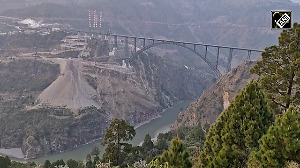United States must realise the threat posed by Pakistan-based terrorist outfit Lashkar-e-Tayiba to its interests across the world, a leading expert has warned.
Citing the foiled attempt in Bangladesh to target US diplomatic missions in Dhaka in November last year, Bruce Riedel -- a senior fellow at the Brookings Institution's Saban Centre for Middle East Policy -- wrote in The Daily Beast: 'What is alarming about the Dhaka attack plan is that LeT has now crossed the threshold of directly targeting American interests. In Mumbai, the group went after hotels and restaurants that catered to American visitors. In Dhaka, they planned to go after an American diplomatic facility. In short, we are now at war with Lashkar.'
Mohammad Motalem alias Majnu, a Bangladeshi operative of the Lashkar, was arrested from Dhaka's Motijheel area on November 23, 2009. During his interrogation, Motalem revealed that the outfit was planning an attack on the Indian High Commission and US embassy in Dhaka. He also confessed that he had participated in the Afghan resistance against the Soviet forces in late 1980s.
According to Riedel, the outfit has cells in United Kingdom, Western Europe, Persian Gulf, Bangladesh and Nepal. It also has supporters and fundraisers in the US and Canada.
'We should encourage all of our partners in the counter-terror world to break up these cells and use any intelligence gained to undermine and weaken this threat. This is a good counterterrorism policy, a good policy for keeping India assured that we take their concerns seriously in the war on terror, and a good way to put pressure on Islamabad to finally take on Lashkar at home,' he observed.
This is not the first time that Obama administration has been warned about India-focussed extremist outfits -- having links with the Al Qaeda -- training their guns on US interests.
Testifying before the House Armed Services Committee about Al Qaeda and US policy, Pulitzer Prize-winner journalist and writer, Steve Coll underlined that the repeated strikes on India by extremist groups like the LeT, Jaish-e-Mohammed (JeM), Lashkar-e-Jhangvi (LeJ) will pose the biggest threat to the US' interests in Afghanistan.
Coll said that the LeT has been recruiting highly educated people such as doctors and other postgraduate professionals in order to provide new and wider dimensions to its nefarious aims.
"The potential of these India-focused groups, with or without clandestine collaboration by Pakistani security forces to repeat or exceed the scale of the provocative attack carried out in Mumbai on November 26, 2008, presents, in my judgment, one of the most serious current threats to US interests in the complex of risks and dangers posed by Al Qaeda," he added.
Coll also pointed out that despite repeated appeals from the US to take on the militants harder, the Pakistan Army is unlikely to act, as it lacks the will to do so.
"The Army also has a clear historical record of lacking the will to abandon its policies of using dangerous Islamist militias, including some affiliated with Al Qaeda, as proxies in its regional competition with India," Coll, who is currently the president and CEO of the New America Foundation, said.
"A risk facing the Obama Administration is that, in its anxiety to avoid aggravating the Pakistan Army and political establishment by making demands about Kashmir -- and India-focused groups it may leave relatively unmolested the very regional networks that the evidence suggests have the talent, time and space to carry out ambitious violence, whether it is in India or elsewhere," the former Washington Post managing editor underlined.






 © 2025
© 2025